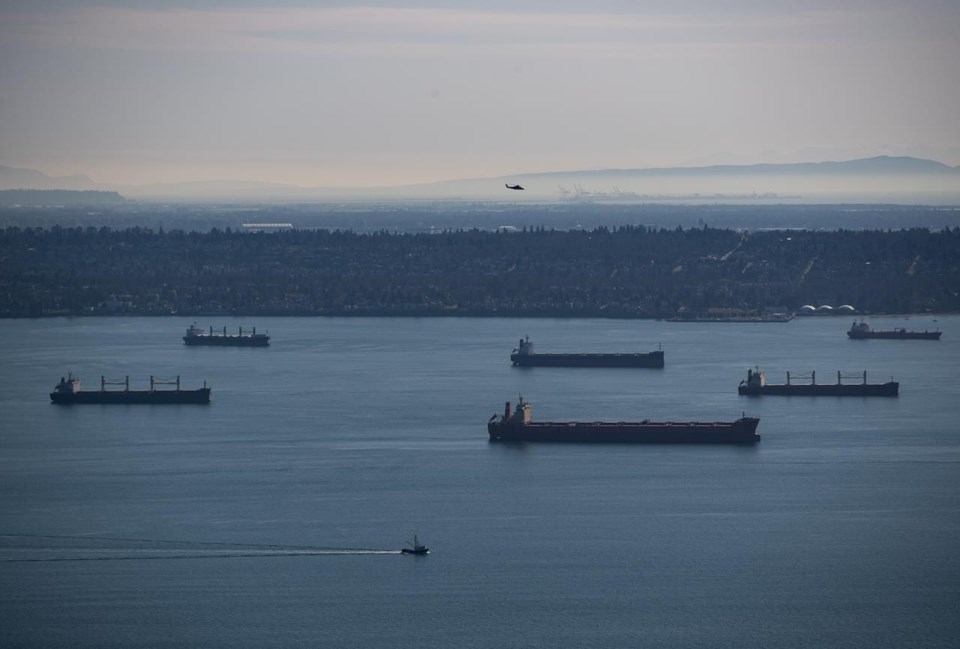OTTAWA — The federal government has approved a contentious container port expansion project at Roberts Bank south of Vancouver, drawing swift condemnation from environmentalists.
The government said Thursday that the Roberts Bank Terminal 2 Project, proposed by the Vancouver Fraser Port Authority, can proceed, subject to 370 legally-binding conditions to protect the environment and prevent harm to local species.
The Canada Pacific Gateway area is the country's most important trade corridor, with more than $275 billion in trade passing through the port authority each year, it said in a statement.
"In the coming years, the government believes Canada’s major West Coast ports will reach maximum capacity, meaning congestion will become a chronic issue," the statement said.
"This project would increase the port’s capacity by 50 per cent," it said. "Without this port expansion, $3 billion in added GDP would be jeopardized by capacity shortages."
The project is also expected to create hundreds of construction jobs and several hundred more both on-site and off-site during operations, it said.
The Wilderness Committee said in a statement the approval comes despite an independent environmental review that concluded the project is likely to have significant adverse effects, including on at-risk species such as killer whales and chinook salmon.
Charlotte Dawe, a conservation and policy campaigner with the committee, said the decision to approve the project left her "shaking with sadness and real rage and frustration."
"There seems to be no limit of harm that's acceptable under the federal government's eyes," Dawe said. "They keep approving projects that are literally dooming species to extinction in the name of corporate profits."
Dawe said the government is well aware of the potential harm to species at risk and biodiversity but chose to approve the project anyway.
She said the Species at Risk Act gives the federal cabinet a lot of discretion, essentially allowing the government to sacrifice at-risk species "in the name of economics."
"The ministers and government that are making decisions on this project know that this is a death sentence for the orcas and for the salmon," she said. "They had every reason to cancel this project."
One of the port's approval conditions involves monitoring noise levels and implementing procedures to delay the departure of container vessels to protect the area's southern resident killer whales.
The government said the decision comes after extensive consultations with local communities and Indigenous groups.
"The approval of this project was not taken lightly," said federal Environment Minister Steven Guilbeault in a statement.
"With strong measures, we will protect our ecosystem, while increasing Canada’s supply chain capacity to ensure Canadians receive affordable goods on time while growing our economy and creating well-paying, middle-class jobs."
Christianne Wilhelmson, executive director of the Georgia Strait Alliance, said the federal government's approval of the project is "devastating news" and "a step backwards."
"This is a government that last month approved $150 million to protect orcas, yet at the same time they're approving projects that are going to harm orcas. It is a contradiction and it just shows the government is still not committed to the protection that the Salish Sea needs."
Wilhelmson said the terminal project will destroy critical habitat for endangered species, further degrading biodiversity at a time when leadership from government is needed to protect it.
"The current system that puts the economy at all costs above the environment is the reason we are in the situation we are with the level of biodiversity loss and climate change impacts," she said. "It's in these moments that a government shows its true colours about what it values."
The project is a three-berth marine container terminal in Delta, B.C., about 35 kilometres south of Vancouver.
"The port expansion has been an issue of concern for residents of Delta for many years now," Mayor George Harvie said in a statement.
"The protection of the Roberts Bank ecosystem, better policing of the port, and Indigenous rights are a few of the major concerns that need to be addressed.
"As mayor, I will continue to work diligently with the federal government and the Vancouver Fraser Port Authority to ensure this expansion is in line with our vision for Delta."
Robin Silvester, president and CEO of the Vancouver Fraser Port Authority, said the project's approval will "bolster our national supply-chain resilience, and deliver generational economic benefits for Canadians and Canadian businesses."
The B.C. Environmental Assessment Office said it is developing a final provincial assessment report on the project and will seek input next month from First Nations and the public.
This report by The Canadian Press was first published April 20, 2023.
The Canadian Press



